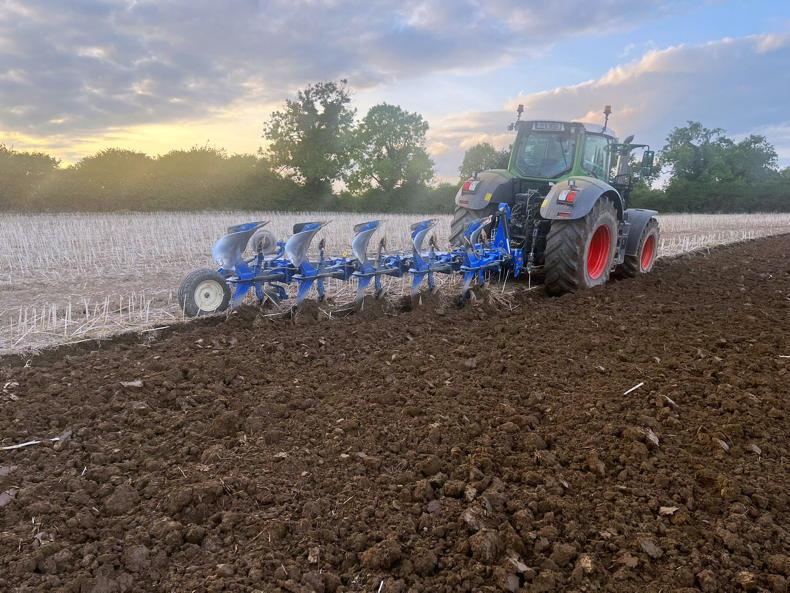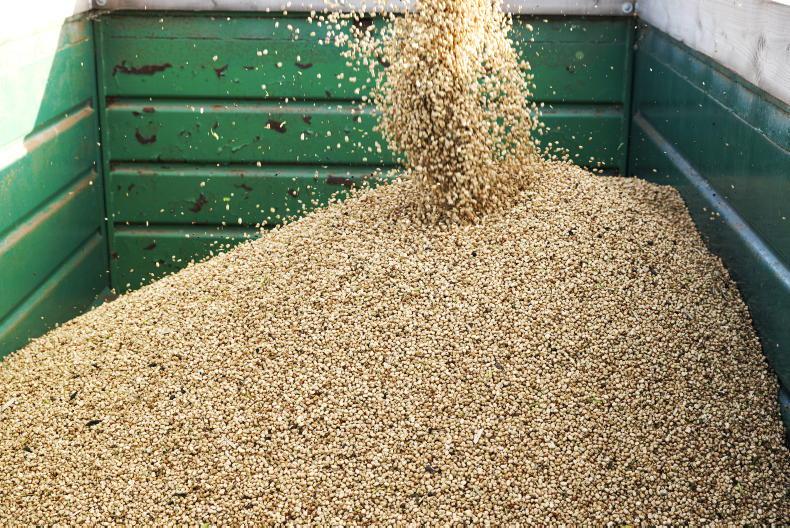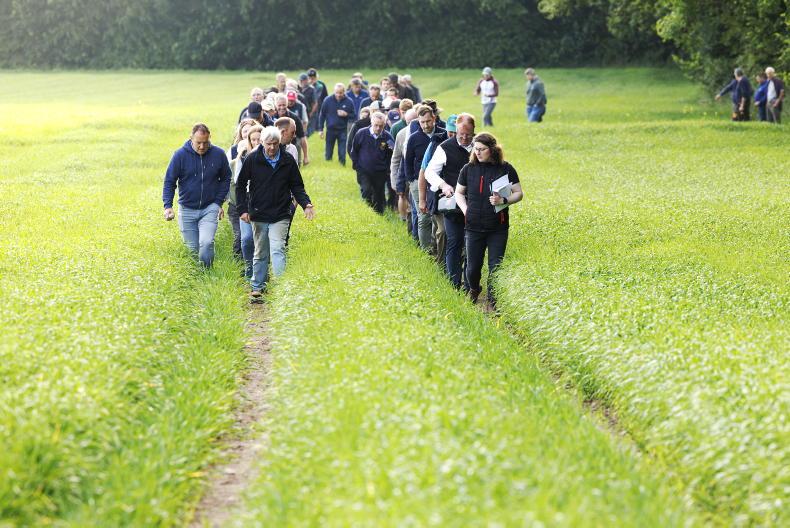Iain McMordie,
Downpatrick,
Co Down
There is still a crop to be harvested on Iain McMordie’s farm and that is spring beans. The first of the crop was being cut on Monday. The beans being cut were ripe, but the remaining fields are only coming ripe now. However, Iain commented that if the weather stays dry, they will keep cutting.
Isabel spring oats were harvested since the last report. Iain was very happy with his spring oat crops, which yielded an average of 3t/ac.
The first of the crop did not break any records, but 50ac all yielded over 3t/ac and brought up the average yield.
Some of the crop was grown under contract for Fane Valley, while more of it was grown for Whites to produce porridge. The grain was dried to 12%.
Oilseed rape
It has been extremely busy on the farm in the past few weeks. Iain has planted oilseed rape and the crop is now well up and growing.
Exsteel was the variety. Slugs were an issue in some parts of fields. Iain said that he applied slug pellets selectively to the areas where slugs were active.
The oilseed rape received Katamaran Turbo post-emergence at 2.5l/ha. This will control broad-leaved weeds. Shotgun was applied on Saturday to control cereal volunteers.
Iain is also preparing to plant winter cereals. The stubbles have now greened up and will receive glyphosate before drilling takes place.
Some winter cereals have already been planted. An area of winter wheat was sown into a heavy clay soil. Iain said the field needs to be worked early and took the opportunity to plant it while it was dry. That crop received Liberator herbicide at 0.3l/ha on Monday.
He might plant another field of winter wheat before moving onto winter barley, which is mostly on dry ground. The beans harvest is the priority for this week.
Derek Rogers,
Ballyboughal,
Co Dublin

Ploughing on the Rogers farm.
Derek Rogers was ploughing for winter cereals when we spoke on Monday. He commented that conditions were ideal and as a result, they will keep ploughing and will plough the headlands as well to allow for easy sowing in a few weeks’ time.
He said 100ml of rain fell the week before last, but it did not stop work and that the soil is in really good condition. He might run a roller over some ground depending on conditions.
Derek said they might sow from 25-30 September, but if the forecast is good, this will be delayed to reduce the risk of virus, grass weeds and disease. Land was tilled and headlands have received glyphosate to control brome.
Winter barley, wheat and oats all have to be planted in the next few weeks. KWS Tardis is the main winter barley variety and this was saved on the home farm and has been dressed.
Derek is also hoping to sow some KWS Joyau and Valerie if he can get some seed. The oats will most likely be Husky, while Gleam and Graham will probably feature in the winter wheat fields.
Most hedgerows that needed to be cut were completed in the wet week. Oilseed rape was planted on 28 August. Derek noted that this is a week ahead of normal and as ground conditions were so good, the seeding rate was lower than normal at 2kg/ha. Exstar was planted, a hybrid variety. Slugs have not been an issue in the crop. The ground was ploughed, tilled, sowed and rolled, and as Derek says, “slug opportunity would be minimal”.
In the potato fields, Derek said there is nothing to write home about with regard to sales and demand. The early Roosters have started and the main crop is now in the desiccation stage receiving Spotlight and Gozai. The main crop harvest will probably start in 10-14 days’ time.
Derek said the major challenge this year is energy costs. Potatoes will be at 13-15°C when harvested and need to get down to 3-4°C. Fridge running costs are three to four times higher than normal.
Dan Twomey,
Robert’s Cove,
Co Cork

The Twomeys incorporating straw.
Dan Twomey was starting into spring wheat when we spoke last. That crop averaged approximately 3.6t/ac at 20% moisture content. Around that time, straw incorporation also took place. The Twomeys chopped about 55ac of straw.
Drying and storing of grain finished over a week ago. Straw handling is now wrapped up. A good few deliveries were made out of the field and winter orders are now stored in the shed.
Dan said a lot of the past week has been taken up with administration and office work. Machinery was being cleaned down and planting equipment was being serviced and checked over the past few weeks.
Glyphosate was applied to winter cereal land over the last few days as well. A rate of 2l/ha was applied and that product contained 360g of glyphosate.
There are plenty of jobs on the list at the minute, from hedge-cutting to drainage work. Dan said he hopes to start ploughing early next week, depending on the weather.
Again, weather dependent, sowing will also start around the 30 September. Integral will be planted. It’s a new variety which claims to have barley yellow dwarf virus tolerance.
Joyau will also be planted. It is another variety claiming BYDV tolerance. Those varieties will most likely be planted first. Varieties deemed to be at higher risk from viruses will be planted later. Tardis is also on the list for seed. It’s a good performing two-row barley, while Pixel and Kosmos are now gone from the farm. The plan is to get oats and wheat in later in October.
Beet
In the beet fields, Score, a fungicide, was applied at 0.5l/ha. The leaves had been wilting and so the fungicide was not applied earlier. Once the plant got enough moisture on board, Dan got the sprayer out, as applying it when the leaves were wilting could have harmed the crop.
Dan commented that the beet looks well and has good potential.
Iain McMordie,
Downpatrick,
Co Down
There is still a crop to be harvested on Iain McMordie’s farm and that is spring beans. The first of the crop was being cut on Monday. The beans being cut were ripe, but the remaining fields are only coming ripe now. However, Iain commented that if the weather stays dry, they will keep cutting.
Isabel spring oats were harvested since the last report. Iain was very happy with his spring oat crops, which yielded an average of 3t/ac.
The first of the crop did not break any records, but 50ac all yielded over 3t/ac and brought up the average yield.
Some of the crop was grown under contract for Fane Valley, while more of it was grown for Whites to produce porridge. The grain was dried to 12%.
Oilseed rape
It has been extremely busy on the farm in the past few weeks. Iain has planted oilseed rape and the crop is now well up and growing.
Exsteel was the variety. Slugs were an issue in some parts of fields. Iain said that he applied slug pellets selectively to the areas where slugs were active.
The oilseed rape received Katamaran Turbo post-emergence at 2.5l/ha. This will control broad-leaved weeds. Shotgun was applied on Saturday to control cereal volunteers.
Iain is also preparing to plant winter cereals. The stubbles have now greened up and will receive glyphosate before drilling takes place.
Some winter cereals have already been planted. An area of winter wheat was sown into a heavy clay soil. Iain said the field needs to be worked early and took the opportunity to plant it while it was dry. That crop received Liberator herbicide at 0.3l/ha on Monday.
He might plant another field of winter wheat before moving onto winter barley, which is mostly on dry ground. The beans harvest is the priority for this week.
Derek Rogers,
Ballyboughal,
Co Dublin

Ploughing on the Rogers farm.
Derek Rogers was ploughing for winter cereals when we spoke on Monday. He commented that conditions were ideal and as a result, they will keep ploughing and will plough the headlands as well to allow for easy sowing in a few weeks’ time.
He said 100ml of rain fell the week before last, but it did not stop work and that the soil is in really good condition. He might run a roller over some ground depending on conditions.
Derek said they might sow from 25-30 September, but if the forecast is good, this will be delayed to reduce the risk of virus, grass weeds and disease. Land was tilled and headlands have received glyphosate to control brome.
Winter barley, wheat and oats all have to be planted in the next few weeks. KWS Tardis is the main winter barley variety and this was saved on the home farm and has been dressed.
Derek is also hoping to sow some KWS Joyau and Valerie if he can get some seed. The oats will most likely be Husky, while Gleam and Graham will probably feature in the winter wheat fields.
Most hedgerows that needed to be cut were completed in the wet week. Oilseed rape was planted on 28 August. Derek noted that this is a week ahead of normal and as ground conditions were so good, the seeding rate was lower than normal at 2kg/ha. Exstar was planted, a hybrid variety. Slugs have not been an issue in the crop. The ground was ploughed, tilled, sowed and rolled, and as Derek says, “slug opportunity would be minimal”.
In the potato fields, Derek said there is nothing to write home about with regard to sales and demand. The early Roosters have started and the main crop is now in the desiccation stage receiving Spotlight and Gozai. The main crop harvest will probably start in 10-14 days’ time.
Derek said the major challenge this year is energy costs. Potatoes will be at 13-15°C when harvested and need to get down to 3-4°C. Fridge running costs are three to four times higher than normal.
Dan Twomey,
Robert’s Cove,
Co Cork

The Twomeys incorporating straw.
Dan Twomey was starting into spring wheat when we spoke last. That crop averaged approximately 3.6t/ac at 20% moisture content. Around that time, straw incorporation also took place. The Twomeys chopped about 55ac of straw.
Drying and storing of grain finished over a week ago. Straw handling is now wrapped up. A good few deliveries were made out of the field and winter orders are now stored in the shed.
Dan said a lot of the past week has been taken up with administration and office work. Machinery was being cleaned down and planting equipment was being serviced and checked over the past few weeks.
Glyphosate was applied to winter cereal land over the last few days as well. A rate of 2l/ha was applied and that product contained 360g of glyphosate.
There are plenty of jobs on the list at the minute, from hedge-cutting to drainage work. Dan said he hopes to start ploughing early next week, depending on the weather.
Again, weather dependent, sowing will also start around the 30 September. Integral will be planted. It’s a new variety which claims to have barley yellow dwarf virus tolerance.
Joyau will also be planted. It is another variety claiming BYDV tolerance. Those varieties will most likely be planted first. Varieties deemed to be at higher risk from viruses will be planted later. Tardis is also on the list for seed. It’s a good performing two-row barley, while Pixel and Kosmos are now gone from the farm. The plan is to get oats and wheat in later in October.
Beet
In the beet fields, Score, a fungicide, was applied at 0.5l/ha. The leaves had been wilting and so the fungicide was not applied earlier. Once the plant got enough moisture on board, Dan got the sprayer out, as applying it when the leaves were wilting could have harmed the crop.
Dan commented that the beet looks well and has good potential.











SHARING OPTIONS